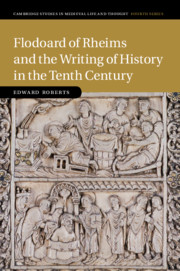Book contents
- Flodoard of Rheims and the Writing of History in the Tenth Century
- Cambridge Studies in Medieval Life and Thought
- Flodoard of Rheims and the Writing of History in the Tenth Century
- Copyright page
- Dedication
- Contents
- Tables
- Acknowledgements
- Abbreviations
- Introduction
- Chapter 1 Flodoard, His Archbishops and the Struggle for Rheims
- Chapter 2 Narrative and History in the Annals
- Chapter 3 Institutional History and Ecclesiastical Property
- Chapter 4 History, Poetry and Intellectual Life
- Chapter 5 Flodoard’s Age of Miracles
- Conclusion
- Bibliography
- Index
Introduction
Flodoard of Rheims and His World
Published online by Cambridge University Press: 05 September 2019
- Flodoard of Rheims and the Writing of History in the Tenth Century
- Cambridge Studies in Medieval Life and Thought
- Flodoard of Rheims and the Writing of History in the Tenth Century
- Copyright page
- Dedication
- Contents
- Tables
- Acknowledgements
- Abbreviations
- Introduction
- Chapter 1 Flodoard, His Archbishops and the Struggle for Rheims
- Chapter 2 Narrative and History in the Annals
- Chapter 3 Institutional History and Ecclesiastical Property
- Chapter 4 History, Poetry and Intellectual Life
- Chapter 5 Flodoard’s Age of Miracles
- Conclusion
- Bibliography
- Index
Summary
This chapter offers a rationale for the book and an introduction to Flodoard’s career and works. It summarises key political developments in the tenth-century West Frankish kingdom and provides an outline of the dominant historiographical interpretations of the period. In theory, Flodoard should be a star witness in debates about the nature of political and social change in the kingdoms and polities that succeeded the Carolingian empire, but his works have tended to be overlooked in favour of charters and other ‘documentary’ evidence. When Flodoard has been invoked by scholars, this usage has tended to be uncritical, primarily because he appears to be a straightforward, impartial writer. From what Flodoard himself tells us about his career, however, this apparent neutrality is clearly an illusion, and therefore an authorial strategy that requires interrogation. Finally, this chapter provides a historiographical survey of the major political and literary approaches to medieval historiography and medieval authors that underpin the methodology of this book.
Keywords
- Type
- Chapter
- Information
- Publisher: Cambridge University PressPrint publication year: 2019

